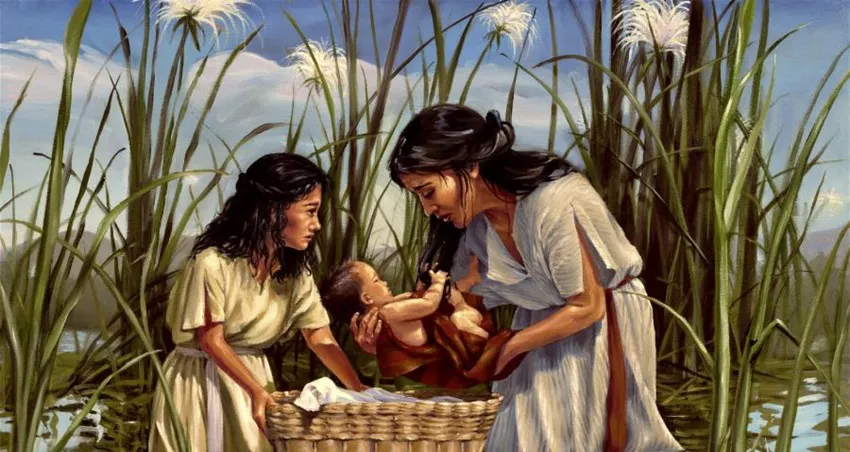Moses is one of the most significant figures in the Bible. His life story is filled with extraordinary events that have inspired countless people. One of the most intriguing aspects of Moses’ early life is his adoption by an Egyptian princess. This story, while often overshadowed by his later achievements, is a critical part of understanding his background and the role of God‘s providence in his life. In this article, we will explore who Moses’ adopted mother was, the context of her role, and the significance of this part of Moses’ life.
The Historical Context
To understand who Moses’ adopted mother was, we need to look at the historical and cultural context of ancient Egypt. During the time of Moses’ birth, the Israelites were enslaved in Egypt. Pharaoh, the king of Egypt, had ordered the killing of all male Hebrew infants to control the growing population of the Israelites. This decree was aimed at preventing the Israelites from becoming too powerful and potentially threatening Egyptian rule.
In this grim setting, Moses’ mother, Jochebed, took a courageous step to save her son. She placed him in a basket made of bulrushes and set it afloat on the Nile River, hoping that someone would find and care for him. This act of faith and desperation was the beginning of a remarkable turn in Moses’ life.
The Egyptian Princess
Moses’ adopted mother was a princess of Egypt, traditionally known as Bithiah in Jewish tradition. Her exact name is not explicitly mentioned in the Bible, but Jewish and Islamic traditions identify her as Bithiah, which means “daughter of God” in Hebrew. According to these traditions, Bithiah was a daughter of Pharaoh who discovered the infant Moses.
The story is described in the Book of Exodus in the Old Testament. As the basket floated on the Nile, it was discovered by Pharaoh’s daughter while she was bathing in the river. The princess had compassion for the crying baby and decided to adopt him, despite knowing he was one of the Hebrew infants her father had decreed to be killed.
See Also: What Is the Symbolism of the Last Supper?
Adoption and Upbringing
Pharaoh’s daughter took Moses into her palace and raised him as her own. This adoption was not merely an act of charity; it had significant implications for Moses’ life. Being raised in the Egyptian royal family, Moses received an education and privileges that were not available to other Israelites. He was educated in the ways of the Egyptians, learning their language, customs, and governance.
This upbringing in the palace allowed Moses to become familiar with the highest levels of Egyptian society and culture. It also provided him with the skills and knowledge that would later prove useful in his leadership role. Moses’ position in the royal household, however, did not sever his connection to his Hebrew roots.
The Role of Jochebed
Moses’ biological mother, Jochebed, played a crucial role in his life despite being separated from him early on. After Moses was adopted, his sister Miriam watched over him from a distance. She approached Pharaoh’s daughter and offered to find a Hebrew woman to nurse the baby. Miriam arranged for Jochebed to be the nurse for her own son, which allowed Jochebed to continue caring for Moses during his early years.
Jochebed’s influence during these formative years was significant. She instilled in Moses a sense of his Hebrew identity and faith. Even though he was raised as an Egyptian prince, the values and beliefs of his biological family remained an essential part of his upbringing.
The Significance of the Adoption
The adoption of Moses by Pharaoh’s daughter had profound implications for the history of the Israelites and for Moses’ role as a leader. Here are a few key points to consider:
Preservation of Life: Moses’ adoption saved him from the decree that sought to kill all Hebrew male infants. This act of divine intervention set the stage for Moses to become a central figure in the liberation of the Israelites from Egyptian bondage.
Education and Influence: Growing up in the Egyptian palace provided Moses with unique insights into Egyptian society and governance. This knowledge was instrumental in his later leadership role when he confronted Pharaoh and led the Israelites out of Egypt.
Connection to Both Worlds: Moses’ position as both an Egyptian prince and a Hebrew allowed him to bridge two worlds. His life embodied the intersection of Egyptian and Hebrew cultures, which played a crucial role in his ability to negotiate and lead effectively.
Divine Plan: The adoption of Moses by Pharaoh’s daughter was part of a larger divine plan. It ensured that Moses would be well-educated and prepared for his future role as a leader and prophet. It also highlighted God’s providence in preserving the life of the future liberator of the Israelites.
Conclusion
The story of Moses and his adoption by Pharaoh’s daughter is a testament to the intricate ways in which God orchestrates events in history. The princess who adopted Moses, traditionally known as Bithiah, played a pivotal role in his early life and in the broader narrative of the Israelites’ liberation. Her act of compassion and the subsequent care provided by Moses’ biological mother, Jochebed, set the stage for Moses to become one of the most influential leaders in biblical history.
Through this story, we see how individual actions, guided by divine providence, can have far-reaching impacts. The adoption of Moses was not just a rescue but a critical part of a divine plan that would lead to the liberation of an entire people. Understanding this aspect of Moses’ life enriches our appreciation of his story and the ways in which God works through human actions to achieve His purposes.


